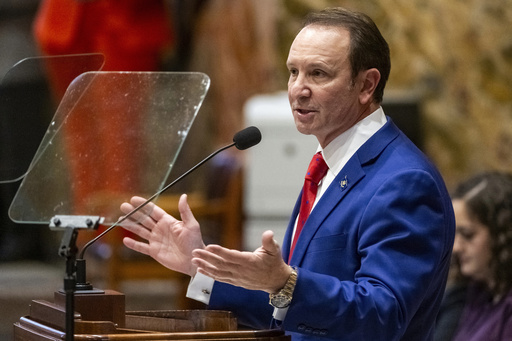
BATON ROUGE, La. — On Tuesday, Louisiana’s House of Representatives, which is predominantly Republican, decisively approved a series of tax cuts for both individuals and corporations, along with a constitutional amendment. These changes are significant components of Governor Jeff Landry’s comprehensive tax reform plan, which is the focal point of the state’s third special legislative session this year.
The House members cast a vote of 87-12 in favor of reducing the individual income tax rate to 3% and increasing the standard deduction for individuals to $12,500. Opposition to the reforms came exclusively from Democratic lawmakers, who voiced concerns that these adjustments offer minimal relief to low-income families while potentially creating a $1 billion deficit in annual state revenues.
Republican Representative Julie Emerson, the main advocate for the bill, argued that the tax cuts are crucial for stimulating economic growth, stopping the exodus of residents from Louisiana, and ensuring the state’s competitiveness with neighboring states such as Florida and Texas, which do not impose income taxes.
Further votes in the House later this week are expected on other proposed bills designed to counterbalance the individual income tax reductions. These include eliminating numerous tax exemptions and expanding sales taxes to cover a variety of services—ranging from dog grooming to lobbying—as well as digital services like Netflix and other streaming platforms. An additional proposal aims to make a 0.45% sales tax and a 2% tax on business utilities permanent, both of which were previously set to expire.
“I think that we are allowing our citizens to make a choice as to how they pay their taxes by choosing the services and the goods that they purchase,” Emerson stated during the House discussion.
In another legislative move, the House voted to abolish the corporate franchise tax, set at 0.275%, which Republicans have criticized as a deterrent to investment. Democratic House Minority Leader Rep. Matthew Willard pointed out that this tax cut, projected to cost the state more than $500 million annually, would primarily benefit shareholders of large corporations, many of which do not operate in Louisiana.
Emerson countered that the benefits would accrue to businesses aimed at “creating jobs in Louisiana.” Supporters claim that the majority of revenue from this tax does not feed into the general fund of the state, asserting that its elimination would not drastically affect budget planning.
The House also approved legislation that would encourage local governments to exempt taxes on corporate assets in return for one-time payments from the state ranging between $1 million and $15 million to attract more businesses. However, lawmakers from both parties expressed doubt about the likelihood of local governments accepting such incentives, given the risk of losing a consistent revenue source.
“Why would they ever opt out of something like this, where they’re going to give up a revenue stream that’s existing in exchange for a one-time buyout?” Republican Rep. Michael Robert Bayham questioned during a committee hearing on October 10.
Department of Revenue Secretary Richard Nelson remarked, “I think the inventory tax really punishes all the businesses that are there,” while also noting that exemptions could encourage businesses to relocate to less economically developed areas within the state.
In addition to the tax cuts, the House green-lighted a constitutional amendment aimed at simplifying the tax code. This amendment would enable a permanent $2,000 salary increase for teachers by lifting constitutional protections on several education trust funds, allowing their assets to be used to settle a substantial $2 billion debt owed to the teacher retirement fund ahead of schedule.
Moreover, the amendment proposes merging two rainy day funds, which would free up more corporate tax and mineral revenue for spending while doubling standard tax deductions for seniors and removing local taxes on prescription medications. It also mandates a two-thirds majority from the legislature for any future tax breaks.
Another piece of legislation, introduced by Republican Rep. Brett Geymann, aims to impose limitations on the annual appropriations for recurring expenses by the Legislature. As the bills proceed to the Senate for further examination, the House is scheduled to discuss proposed sales tax measures on Wednesday that are designed to support the tax cuts.
